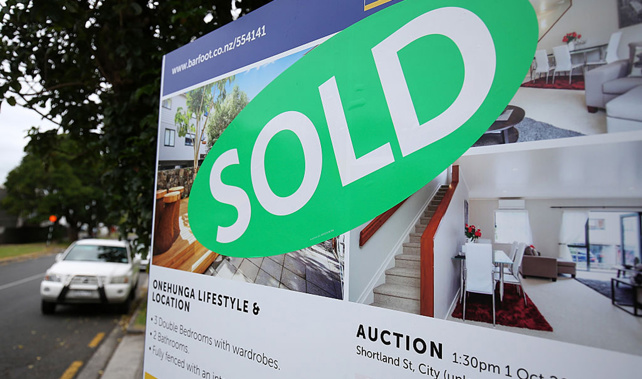
Housing sales volumes and prices are continuing to decline and the Real Estate Institute has forecast "further" easing of price growth in the coming months.
Jen Baird, REINZ chief executive, said sales numbers continued to trend down and an influx of stock was easing demand pressure "which may in turn further ease price growth in the coming months."
She blamed three factors: "The Credit Contracts and Consumer Finance Act, the reintroduction of loan to value ratios and increases to the official cash rate, with further increases expected, are affecting buyers who are increasingly showing caution. While the appetite and demand for property remains, we are hearing from agents across the country that open homes and auction rooms are quieter."
REINZ data showed national house sale volumes dropped 33 per cent annually but Auckland volumes fell by 40 per cent.
Last February, 8300 homes were sold but that fell 5500 last month while in Auckland, last year's 2900 dropped to 1740.
Prices rose only marginally nationally, up 0.6 per cent from January's $880,000 to $885,000 last month.
Auckland prices dropped from January's $1.2m median to $1.1m last month.
West Coast sales halved from last February's 90 to 40 last month, the lowest for a February since 2017.
Taranaki sales dropped 41.3 per cent annually from 206 to 121, the lowest sales count for a February month since records began.
Manawatu/ Whanganui sales were down 40 per cent annually from 382 to 229, also the lowest number of record.
The latest OneRoof-Valocity House Value Index out on March 1 also showed an easing of house price growth across most regions.
The nationwide average property value rose 4 per cent to $1.101 million in the three months to the end of February, down from growth of 5.9 per cent in the three months to the end of January.
In a sign that new lending rules and rising interest rates are starting to bite, several regions registered quarterly growth well below the nationwide average.
Baird of REINZ said last year's conditions were unusual.
"Record low levels of properties available for sale last year, as well as low interest rates and anticipation of LVRs, brought urgency to the market. However, towards the end of 2021, we saw a surge in the number of listings. This has continued into February, with listings across New Zealand up 7.5 per cent."
The number of days it takes to sell a property nationally increased annually by 11 days to 42 days last month.
The number of houses for sale nationally ballooned 47 per cent, from 15,800 last February to 23,200 last month.
Inventory in Manawatu/Whanganui rose 161 per cent and in Wellington was up 143 per cent. Hawkes Bay houses for sale rose 98 per cent from last year to last month.
All areas except the West Coast and Gisborne saw the number of houses for sale rise, some quite significantly.
Auction sales dropped from 28 per cent of all sales a year ago to 22 per cent last month.
Westpac's latest housing research out last month from acting chief economist Michael Gordon said there was now enough evidence to declare that the housing boom has ended, with prices turning downward in the last two months.
"We've long been saying that house prices can and would fall once we saw a meaningful rise in mortgage rates. That has now happened, with fixed-term rates now factoring in the prospect of a series of OCR hikes over the next couple of years," Gordon said.
Changes to lending regulations will also have contributed to the slowdown to some degree.
Their greatest impact is being felt right now while the changes are being bedded in, but we think their effects on house values will be less enduring.
Once mortgage rates rise from their lows, the housing boom would cool off and tip over into modest price declines, Gordon noted Westpac had forecast.
But the timing of that price drop has always been fluid. At one point Westpac expected it to begin in the early part of this year, later pushing that out until the middle of the year when it seemed that the market still had quite some momentum behind it.
"But now, we have enough evidence to show that the turnaround began in late 2021. The REINZ house price index fell by 0.9 per cent in January, the second straight month of decline. As in December, the Auckland region led the drop in prices, but now the rest of the country has joined it as well. Prices are still up 20 per cent on a year ago, reflecting the rapid price gains through much of 2021, but that measure is now coming down fast," Gordon said.
House sales have been steadily declining over much of the past year. But while that previously could have been described as a moderation in the Covid-era boom, we're now beyond that point, and sales are running below their pre-pandemic levels, he said.
Take your Radio, Podcasts and Music with you









